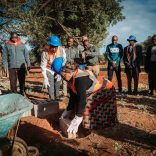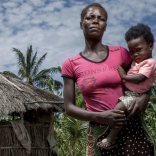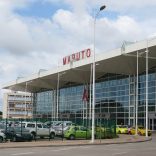British High Commission receives Mozambican students returned from Chevening scholarships
Archbishop emeritus of Nampula D. Manuel Vieira Pinto dies at 96

File photo: DN
D. Manuel Vieira Pinto, archbishop emeritus of Nampula, died on Thursday at the age of 96 at the Casa Sacerdotal of the Oporto diocese in Portugal.
His funeral was presided over by D. Manuel Linda on Friday, May 1st, in Cedofeita church in Oporto, the Ecclesia news agency announced.
Born in Amarante, Portugal, D. Manuel Vieira Pinto was appointed bishop of Nampula in 1967 and, in the ecclesiastical reorganisation of Mozambique creating new dioceses and, years later, with the elevation of the dioceses of Beira and Nampula to archdioceses, he was appointed archbishop of Nampula,in June 4 1984.
The Portuguese prelate resigned on January 18, 1998, remaining in the Mozambican archdiocese until his retirement in 2000, then returning to Portugal (November 16 2000).
D. Manuel da Silva Vieira Pinto was born on December 9, 1923, in Aboim, Amarante, in the Oporto diocese. He was ordained presbyter in the cathedral of his diocese by D. Agostinho de Jesus e Sousa on August 7, 1949, having been coadjutor in the parish of Campanhã and assistant to several Catholic Action bodies.
In 1955, he was appointed spiritual director of the Diocesan Seminary of Nossa Senhora do Rosário de Vilar and was the national representative of the ‘Movement for a Better World’, after some time in Rome in 1960, getting to know the apostolic movement.
Pope Paul VI called him to the episcopate on 27 April 1967 to be bishop of Nampula and was ordained on 29 June of the same year in the church of Trindade by the apostolic nuncio in Portugal, D. Maximiliano Furstemberg.
Recognised for his anti-fascist stance during the Estado Novo regime, he was invited to join the Council of State by General António Spínola immediately after April 25, 1974, an invitation he declined.
Before that, he was arrested by the Portuguese political police (PIDE) and forced into exile by the Salazar Government in 1958, after the presidential elections in which General Humberto Delgado ran.
At that time, the Bishop of Oporto sent Father Manuel Vieira Pinto to Rome to study the ‘Movement for a Better World’ led by Father Ricardo Lombardi. Later, it would be D. Manuel Vieira Pinto who introduced this Christian movement to Portugal.
Speaking to Rádio Renascença, the current bishop of Oporto, D. Manuel Linda, remembers D. Manuel Vieira Pinto as a “persona non grata” of the fascist regime in Portugal, on account of his opposition to the Colonial War, among other things.
“The truth is that he is already a bishop and a priest from another time. Anyway, in my time as a student, I often heard of D. Manuel Vieira Pinto, who, as bishop of Nampula, was the man who defended the rights of the people of Mozambique and condemned, from the first moment, colonialism and the Colonial War. This made him a persona non grata for the ”Estado Novo” regime. But he will be remembered as one of the greatest in the Mozambican state,” the bishop of Oporto said.
During his time in Nampula, D. Manuel Vieira Pinto wrote several pastoral letters and socio-political reflections based on the events taking place in Mozambique at the time, namely “Paths of new mission-pastoral structures”, “At a time of turning” and “From the missions to the local Church”.
But the documents that had the greatest influence on the political, social and religious life of his diocese, and of Mozambique, were “Rethinking the War” (January 1974) and “An Imperative of Conscience” (February 12, 1974) – signed by the bishop and by the 34 priests, 19 missionaires and 41 sisters of the Comboni working in Northern Mozambique.
Those pastoral letters, his firm position in defence of the rights of the Mozambican populations, the condemnation of colonialism and colonial war, the defence of the right to self-determination of the Mozambican people, caused his expulsion from Mozambique, on April 14, 1974, after which he went to live in Cartaxo.
Returning to Mozambique, he was elected President of the Episcopal Conference of Mozambique (CEM), on January 1, 1975.
In post-independence Mozambique, he continued to fight for the dignity, rights and freedoms of the Mozambican people, holding interviews with leaders of the country such as presidents Samora Machel and Joaquim Chissano.
He fought using all possible means to end the war between Frelimo and Renamo, whose atrocities he publicly denounced. In May 1984, in an interview with President Samora Machel, he spoke openly about the fratricidal civil war and proposed the urgent start of political negotiations with the resistance.
He played an important but discreet role in the mediation and peace negotiation process in Mozambique, and, even after the elections in Mozambique, met Afonso Dlakhama to try to ensure the acceptance of the results by Renamo.
He was awarded the Order of Liberty at the national tribute in his honour held in Oporto on October 31, 1992, by the then-president of Portugal, Dr. Mário Soares,
On November 21, 1992, Amarante Municipality awarded him the municipality’s Gold Medal.
From December 1992 to January 1998 he served as apostolic administrator of Pemba.
In 1995 and following years, he had a prominent role in the installation of the Catholic University in Mozambique, in whose directorate he served.
On December 8, 2003, on the occasion of his 80th birthday, he was honoured in his birthplace – Aboim (Amarante) – on the initiative of the local newspaper “Jornal da Terra”. A commemorative plaque was unveiled in the house where he was born and the square outside Aboim parish church was renamed in his honour.
In 2017, the then-bishop of Oporto D. António Francisco dos Santos published a pastoral note of “joy and gratitude” for the 50 years of Manuel Vieira Pinto’s episcopal service, highlighting the Portuguese archbishop’s “life full of charm and giving to God and to the Church so that the World is Better”.
“D. Manuel Vieira Pinto has always been on the side of people, their dignity, their most genuine values and their struggle for freedom, democracy and peace in the land of good people who have the right to be happy,” António Francisco dos Santos said on the occasion.
In that year, the missionary Father José Luzia published a book about Pinto called “The Visionary of Nampula” and highlighting his contribution to the dynamism and renewal of the Catholic Church in Mozambique, namely in the transition to independence, where he worried over the “defence of the people and not the defence of God”. Interviewed on the Ecclesia programme, Father Luzia, who worked with the archbishop from the age of 22, recalls the gagging and expulsion of D. Manuel Vieira Pinto from Mozambique in 1974, for raising his voice against the colonial war, and the oppression and suffering of the Mozambican people.












Leave a Reply
Be the First to Comment!
You must be logged in to post a comment.
You must be logged in to post a comment.